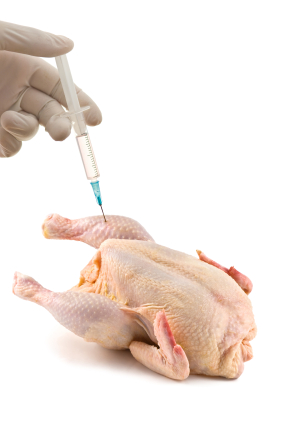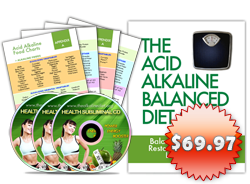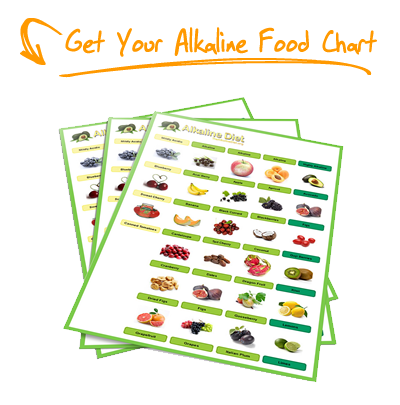The Hidden Dangers of Hormones in Vegetables and Meat
Posted on 02. Sep, 2010 by Staff Writer Candy Del Carmen in Alkaline Diet Tips, Blog
 Most consumers are lured with bigger and fresher look of vegetables and fruits without knowing the hidden harmful effects behind the accelerating and instantaneous ripening of these crops. Yet, many nutritionists and health experts around the world are alarmed on the implications of these crops and even meats injected with hormones on human health.
Most consumers are lured with bigger and fresher look of vegetables and fruits without knowing the hidden harmful effects behind the accelerating and instantaneous ripening of these crops. Yet, many nutritionists and health experts around the world are alarmed on the implications of these crops and even meats injected with hormones on human health.
Hormones are injected and widely used in agriculture for the primary reason of making profitable income. Let us find out how are these treated foods become alluring to the eye of most consumers, what are the possible effects in the long term, and how can we avoid such harmful effects.
Rampant Usage of Hormones in India
Indian farmers are reported injecting hormones on their crops with toxic substance called oxytocin, the naturally-occurring reproductive hormone which is found in mammals and injected to women during childbirth to stimulate uterine contractions. They are using hormones in replacement to an expensive fertilizer so that vegetables can mature faster. The same steroid drug with oxytocin is injected to minor age girls in some rural part of Rajasthan to look older than their real age before their wedding. Much worst, minor sex workers in Bangladesh have been using the same steroid for almost the same reason: to speed up the puberty and these girls can be trafficked into prostitution.
In one of the interviews conducted to one farmer in Ludhiana who has been using oxytocin to his crops, he was frustrated that the agricultural experts whom he consulted about the fluctuated temperature cannot explain why his crops become fruitless and barren. Therefore, farmers in India are resorting to this malpractice due to weather patterns, aside from the increase profit on their part.
On the other hand, nutritionists and health experts are alarmed with the new advent of farming employed by Indian farmers. According to Dr. Preeti Vijay of Max Healthcare in India, any fruits and vegetables that were grown and harvested with the help of hormones will not immediately effect on health right after consumption. Nevertheless, various ailments may occur if continuously taken for long period of time. The damage can be irreparable including memory loss, cardiovascular diseases, and nervous breakdown.
Hormones in Meat
Not only vegetables are laced with hormones, but including animals like, chicken, cattle and cows. There are certain hormones injected in young animals so that they can gain weight faster. It helps the meat and dairy industries to make more profit because of the reduced waiting time for an animal to be slaughtered and sold in the market. Not only that the amounts of feeds are lessened, but hormones can also increase milk production.
If we would trace back the widespread use of hormones in meat products, this has been used since 1930s in United States and some other countries. In fact, group of researchers in University of California discovered that diethylstilbestrol or DES that was injected in male chickens. Treated male chickens are found to produce juicy breast meat and can be sold in the market faster than the usual poultry process. Same thing goes with cows injected with bovine growth hormone or bGH drawn from cow (bovine) pituitary glands. Then in 1950s, the use of female sex hormone estrogen has been used in poultry and cattle to speed up the increase in size of chickens and cattle. It was in 1970s that the use of DES was phased out and banned to use as growth hormone in chicken production.
Health Implications of Growth Hormone in Foods
Hormone additives stirred up safety debates endless times. For instance, this growth hormone almost similar to bGH known as bovine somatotropin or BST was approved by Food Drugs and Authority in 1993. Groups of consumer activists oppose for this approval because treated cows were suffering from infection that would require for antibiotic therapy. With this regard, activists contend that antibiotic can be passed to humans. Likewise, according to Jeffrey Fisher, physician and author of book titled The Plague Makers, any vegetables and fruits fertilized with manure from any treated cows contain antibiotic-resistance genes.
Although there are no conclusive results whether foods injected with growth hormones have health implications, here are some of the theories given by some researchers and scientists:
- Estrogenic chemicals injected like DDE can be associated to breast cancer. The assumption was based on the study conducted by Mt. Sinai Medical Center in New York to 58 breast cancer patients who were found to have high levels of DDE to their blood serum. The same chemical was also found that interferes with the mother’s natural ability to lactate.
- Early puberty among teenage girls in Puerto Rico and Italy were linked to their exposure to meat with injected growth hormones, although there were no conclusive results on the assumption. Further studies have to be made what other factors influences that affect their early puberty onset.
- The National Academy of Sciences documented cases of children who are susceptible with the toxic effects of chemicals in growth hormone. Children who consumed milk fat and breast-fed were 40 times vulnerable to various diseases. The cases are verified by clinical studies. For instance, in 1979 in Taiwan, repercussions in children that were born to women who ate the primary biliary cirrhosis or PBC contaminated rice bran oil that were victims of mass poisoning. Another case in 1985 wherein 117 children born to women who were also ingested contaminated oil were examined. These exposed children had abnormalities of the lungs, gums, nails, teeth, and skin. Another effects were reflected on their less weight and height, deficits on their formal developmental testing, abnormalities on behavioral assessment, and even boy ranges from 11-14 had shorter penises.
- Long term exposure to hormones in foods are claimed to pose serious health problems like heart problems, memory decline, and infertility. Although, further studies need to back up these claims, it is worth taking a note of the health consequences when consuming crops and meats injected with growth hormone.
Health tips to reduce exposure to hormone-treated foods
- Organic products are always recommended by health and nutrition experts. Although it is the most ideal, not all consumers have the access or budget to afford organic vegetables, fruits, and poultry products. Just do not be lured to aesthetically appealing crops. Most common vegetables injected with hormones are watermelon, pumpkin, cucumber, and aubergine to make it bigger, fresher, and more attractive to the consumers.
- Buying dairy products and hormone-free meat can be very expensive. If you can change to vegetarian lifestyle, well and good. Nevertheless, when meat cannot be avoided in meal, eat the leanest part (less liver and fat), and eat meats in moderation. Dominate your plate with 80% vegetables or rich in fiber food and only small portion of lean meat is recommended.
Despite the ban implemented by the government to use any hormone growth to speed up the process of growth among vegetables and poultry animals and cattle, it seems useless because farmers can still purchase hormone in drug stores or in any fertilizer and pesticide market, particularly in India. With this regard, no amount of strict regulation can prevent those violators and for our best interest, just be a wise consumer and learn more on the food you are preparing on your dining table. This is about you and your family, this is all about your health and the risk it implies when we are lured and blinded with the façade of these crops and meats laced with toxic growth hormones.





Recent Comments